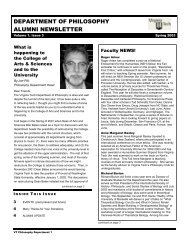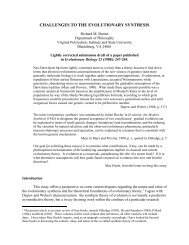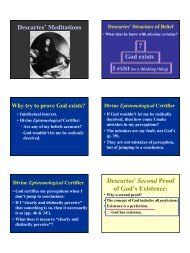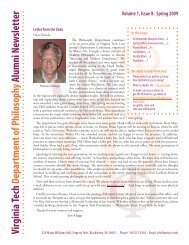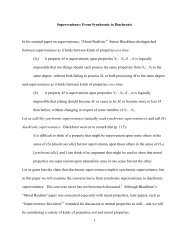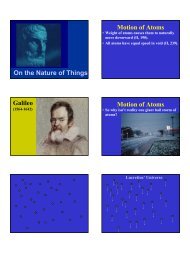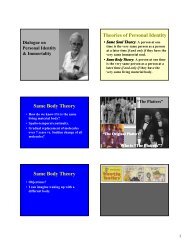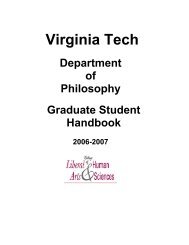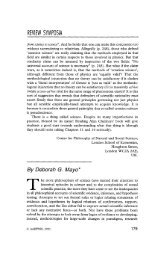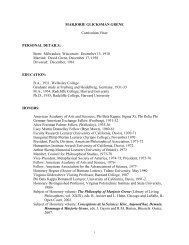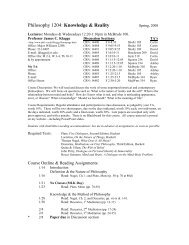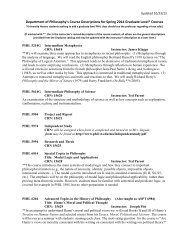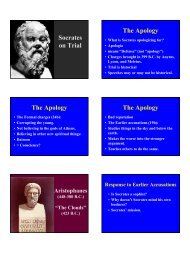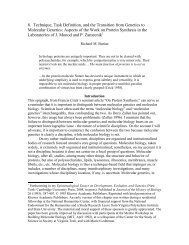Wittgenstein in Exile
Wittgenstein in Exile
Wittgenstein in Exile
You also want an ePaper? Increase the reach of your titles
YUMPU automatically turns print PDFs into web optimized ePapers that Google loves.
stand. That spirit expresses itself <strong>in</strong> an onwards movement, <strong>in</strong> build<strong>in</strong>g ever larger and more<br />
complicated structures; the other <strong>in</strong> striv<strong>in</strong>g after clarity and perspicuity <strong>in</strong> no matter what<br />
structure. The first tries to grasp the world by way of its periphery—<strong>in</strong> its variety; the second at<br />
its centre—<strong>in</strong> its essence. And so the first adds one construction to another, mov<strong>in</strong>g on and up, as<br />
it were, from one stage to the next, while the other rema<strong>in</strong>s where it is and what it tries to grasp is<br />
always the same.<br />
A student recalls <strong>Wittgenste<strong>in</strong></strong>, <strong>in</strong> a 1934 lecture, ejaculat<strong>in</strong>g: “Civilisation, or whatever you call the bloody<br />
th<strong>in</strong>g!” (Theodore Redpath, Ludwig <strong>Wittgenste<strong>in</strong></strong>: A Student’s Memoir, London: Duckworth, 1990, p. 36).<br />
7 Drury recalls <strong>Wittgenste<strong>in</strong></strong> pronounc<strong>in</strong>g, <strong>in</strong> 1930: “Music came to a full stop with Brahms; and even <strong>in</strong><br />
Brahms I can beg<strong>in</strong> to hear the sound of mach<strong>in</strong>ery” (p. 112). See also his thoughts on the problems with<br />
modern music <strong>in</strong> “Movements of Thought,” PPO, pp. 67-9.<br />
In the discussion of my paper at the conference, <strong>in</strong> response to comments by Timothy Tess<strong>in</strong>, I<br />
agreed that the phrase “accounts for” is wrong, and I would now change this to “is closely connected with”.<br />
It is not that Spengler’s theory caused <strong>Wittgenste<strong>in</strong></strong> to dislike modern art, but rather, <strong>Wittgenste<strong>in</strong></strong>’s dislike<br />
of modern art and his feel<strong>in</strong>g that he was liv<strong>in</strong>g <strong>in</strong> a civilization rather than a culture are two sides of the<br />
same co<strong>in</strong>.<br />
8 Spengler, p. 40 (most of this is <strong>in</strong> the abridged edition, p. 31).<br />
In light of this dist<strong>in</strong>ction between “culture” and “civilization,” “Culture and Value” turns out to<br />
be an extremely mislead<strong>in</strong>g title for the miscellaneous collection of remarks published orig<strong>in</strong>ally <strong>in</strong> German<br />
under the title Vermischte Bemerkungen [Miscellaneous Remarks].<br />
9 C&V p. 10/12-13. The notion of the “remnant” is prom<strong>in</strong>ent <strong>in</strong> Isaiah 10: 20-23, 11: 11-16, and 37: 31-<br />
32.<br />
The difficulties that <strong>Wittgenste<strong>in</strong></strong> encountered <strong>in</strong> writ<strong>in</strong>g from with<strong>in</strong> a time of civilization for an<br />
audience of a culture are explored <strong>in</strong> my paper “The Puzzle of Goethe’s Influence on <strong>Wittgenste<strong>in</strong></strong>,” <strong>in</strong><br />
Goethe and <strong>Wittgenste<strong>in</strong></strong>: See<strong>in</strong>g the World’s Unity <strong>in</strong> Its Variety, ed. F. Breithaupt, et al., Frankfurt: Peter<br />
Lang, 2003.<br />
10 “<strong>Exile</strong>” is a term that <strong>Wittgenste<strong>in</strong></strong> used to describe himself: Upon contemplat<strong>in</strong>g a move to Norway <strong>in</strong><br />
1913 to cont<strong>in</strong>ue his research, <strong>Wittgenste<strong>in</strong></strong> was cited by his friend David P<strong>in</strong>sent as follows: “he swears he<br />
can never do his best except <strong>in</strong> exile” (October 1 st , 1913 diary entry, <strong>in</strong> A Portrait of <strong>Wittgenste<strong>in</strong></strong> as a<br />
Young Man, ed. G.H. von Wright, Oxford: Blackwell, 1990, p. 85, and cf. p. 89). In his coded wartime<br />
notebook <strong>Wittgenste<strong>in</strong></strong> wrote: “This k<strong>in</strong>d, friendly letter [from P<strong>in</strong>sent] opens my eyes to the fact that I am<br />
liv<strong>in</strong>g <strong>in</strong> exile [Verbannung] here. It may be a heal<strong>in</strong>g exile, but I now feel it as an exile all the same”<br />
(Geheime Tagebücher: 1914-1916, ed. W. Baum, Vienna: Turia & Kant, 1991, 26.7.16, p. 74). And also<br />
his comment <strong>in</strong> his diary: “In my room I feel not alone but exiled [exiliert]” (“Movements of Thought,”<br />
PPO, 9.10.30, p. 55).<br />
For more on <strong>Wittgenste<strong>in</strong></strong>’s <strong>in</strong>ability to f<strong>in</strong>d comfort <strong>in</strong> any community, see my papers: “When<br />
Are Ideologies Irreconcilable? Case Studies <strong>in</strong> Diachronic Anthropology,” Philosophical Investigations,<br />
July, 1998; and “<strong>Wittgenste<strong>in</strong></strong>’s Community,” <strong>in</strong> eds., U. Meixner & P. Simons, Metaphysics <strong>in</strong> the Post-<br />
Metaphysical Age: Papers of the 22 nd International <strong>Wittgenste<strong>in</strong></strong> Symposium, Vol. VII (1), 1999. The<br />
former concerns his experiences dur<strong>in</strong>g World War I, the latter his experiences <strong>in</strong> Norway. Though the<br />
present paper is primarily about <strong>Wittgenste<strong>in</strong></strong>’s cultural isolation, it is an <strong>in</strong>terest<strong>in</strong>g and relevant fact that<br />
he often sought psychological and physical isolation. In addition to his time <strong>in</strong> Norway, there is also his<br />
time, after retirement, <strong>in</strong> western Ireland.<br />
11 Psalm 137:1. In 1948 <strong>Wittgenste<strong>in</strong></strong> wrote: “Someone lack<strong>in</strong>g a tradition who would like to have one is<br />
like a man unhappily <strong>in</strong> love” (C&V p. 76/86). <strong>Wittgenste<strong>in</strong></strong> was certa<strong>in</strong>ly a man unhappily <strong>in</strong> love...with<br />
Marguerite Resp<strong>in</strong>ger. His feel<strong>in</strong>gs are described extensively <strong>in</strong> the first year’s worth of entries <strong>in</strong><br />
“Movements of Thought,” PPO, pp. 9-81.<br />
12 Septuag<strong>in</strong>t version of Isaiah 40:3, as later quoted <strong>in</strong> Matthew 3:3 and John 1:23 and applied to John the<br />
Baptist.<br />
13 Spengler, p. 44 (some of this is on p. 34); and also p. 40 (some on p. 31). Discuss<strong>in</strong>g <strong>in</strong> 1946 an upcom<strong>in</strong>g<br />
Jo<strong>in</strong>t Session of the M<strong>in</strong>d Association and the Aristotelian Society meet<strong>in</strong>g, <strong>Wittgenste<strong>in</strong></strong> “railed<br />
aga<strong>in</strong>st professional philosophers, mourned the present state of philosophy <strong>in</strong> England and asked: ‘What<br />
can one man do alone?’ ” (Karl Britten, <strong>in</strong> Portraits of <strong>Wittgenste<strong>in</strong></strong>, vol. 2, ed. F. Flowers, Bristol:<br />
Thoemmes Press, 1999, p. 210). And cf. <strong>Wittgenste<strong>in</strong></strong>’s reference to the philosophical “charlatans” <strong>in</strong> his<br />
13



